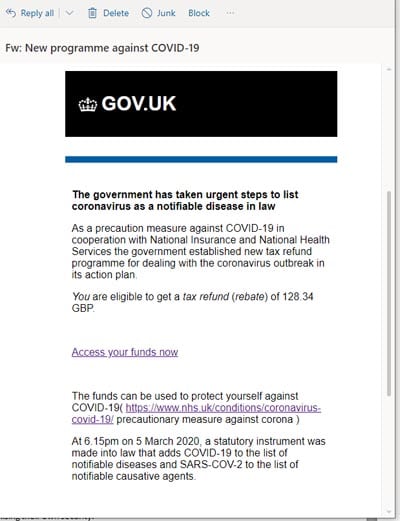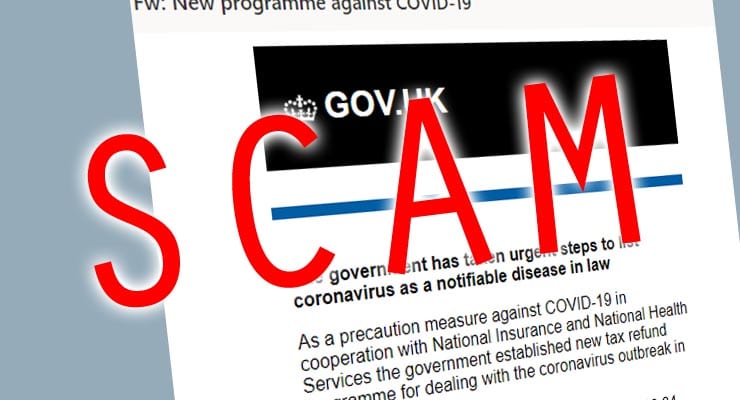Watch out for UK government coronavirus “tax rebate” email scam
UK readers should be aware of a new spate of email scams exploiting the 2019 coronavirus COVID-19 outbreak that claim the UK government is offering a tax refund program to help recipients protect themselves from the virus.
 PHISHING SCAM
PHISHING SCAM
The email claims that as a precautionary measure, the government has launched a new action plan to deal with the coronavirus outbreak that means email recipients are eligible for a tax refund. The text of one of the scam emails can be seen below.

The government has taken urgent steps to list coronavirus as a notifiable disease in law
As a precaution measure against COVID-19 in cooperation with National Insurance and National Health Services the government established new tax refund programme for dealing with the coronavirus outbreak in its action plan.
You are eligible to get a tax refund (rebate) of 128.34 GBP.
Access your funds now
The funds can be used to protect yourself against COVID-19( https://www.nhs.uk/conditions/coronavirus-covid-19/ precautionary measure against corona )
At 6.15pm on 5 March 2020, a statutory instrument was made into law that adds COVID-19 to the list of notifiable diseases and SARS-COV-2 to the list of notifiable causative agents.
It’s a phishing scam. There is no tax rebate or government “action plan”. The link in the email leads to a spoof website designed to look like the Gov.UK website that will steal your information.
Email recipients that click the link will be forwarded to a webpage that appears to look like the UK government website. The webpages requests the recipient fill in a number of fields in order to claim their tax refund as purported by the email. This information includes the visitor’s name, date of birth, address, mother’s maiden name and their credit card and bank account information.
If a visitor fills in this information, they will become the victim of identity theft, since the information they enter is sent to scammers. The information can allow scammers to purchase items using the victim’s card information and can also allow scammers to create online accounts and subscriptions in the victim’s name.
Sponsored Content. Continued below...
Watch out for those red flags!
It’s a phishing scam, and that means there are plenty of red flags to watch out for.
Firstly, avoid clicking on links in emails, since they can take you anywhere. If in doubt, open your Internet browser and type in the relevant web address directly.
If you do click a link in an email, look at the web address of the webpage it takes you to. Is it the web address you should be on? If it looks wrong, or suspicious, don’t enter any information into it.
Be especially wary of emails like the one above offering you money. This is often a ruse to trick victims into compromising their own security.
Watch out for bad grammar and spelling in emails. The email above contains numerous grammatical errors.
Sponsored Content. Continued below...
Watch out for emails that don’t mention your name. The email above doesn’t address you by your name. An official email from the UK government would use your name.
Is the webpage asking for information it doesn’t need? In this case, the webpage asks for information like your credit card information and mother’s maiden name, but it shouldn’t need this in order to process a tax rebate.
If in doubt, don’t enter personal or sensitive information! There are many red flags here, and anyone clued up on Internet privacy and security should be able to spot this scam a mile away. However, it’s design is quite convincing, so those not familiar with phishing scams may get caught up with this one. Please educate friends and family that you think may be vulnerable to this scam, and share this information to help protect others.
Keep up-to-date with all the latest cybersecurity threats and our tips to stay safe online. Follow us on Facebook, Instagram and Twitter.
Continued below...
Thanks for reading! But before you go… as part of our latest series of articles on how to earn a little extra cash using the Internet (without getting scammed) we have been looking into how you can earn gift vouchers (like Amazon vouchers) using reward-per-action websites such as SwagBucks. If you are interested we even have our own sign-up code to get you started. Want to learn more? We discuss it here. (Or you can just sign-up here and use code Nonsense70SB when registering.)
Become a Facebook Supporter. For 0.99p (~$1.30) a month you can become a Facebook fan, meaning you get an optional Supporter Badge when you comment on our Facebook posts, as well as discounts on our merchandise. You can subscribe here (cancel anytime.)

